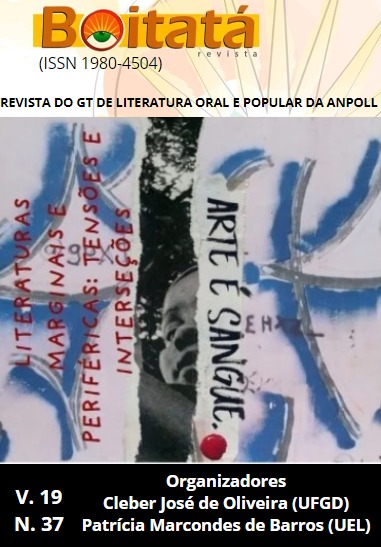Between the aesthetic and the political: the rap dimensions thought from the verses of Favela Vive and R.U.A
DOI:
https://doi.org/10.5433/boitata.2024v19.e50190Keywords:
Hip-hop, Rap, Outskirts, Music, CollectivityAbstract
The hip-hop is a movement that arise from the diaspora and represent a way of resistance and existence of the population that live on the cities' outskirts, who, through that culture elements, confronts the hegemonic discourses and constitutes a fight for the right to the city and to the word. Therefore, this paper focus on the verses of the musical projects Favela Vive and R.U.A, in order to find focal points among the multiple marginalized people voices that compose them and reveal the collectivity in the personal discourses, to set a portrait of the outskirts.
Downloads
References
CAMARGOS, R. Rap e política: percepções da vida social brasileira. São Paulo: Boitempo Editorial, 2015.
CARVALHAL, T. F. Literatura comparada: a estratégia interdisciplinar. Revista Brasileira de Literatura Comparada, Rio de Janeiro, n. 1, p. 9-21, mar. 1991.
EBLE, L. J. Escrever e inscrever-se na cidade: um estudo sobre literatura e hip-hop. 2016. Tese (Doutorado) - Universidade de Brasília, Brasília, 2016.
FACÇÃO Central - a boca só se cala quando o tiro acerta. [S. l.: s. n.], 2012. 1 vídeo (4 min 59 s). Publicado pelo canal Edson Marques. Disponível em: https://www.youtube.com/watch?v=4UyurAD30bE. Acesso em: 11 ago. 2023.
FAVELA Vive 2 (Cypher) - ADL, BK, Funkero e MV Bill (Prod. Índio). [S. l.: s. n.], 2017. 1 vídeo (7 min 36 s). Publicado pelo canal Esfinge. Disponível em: https://www.youtube.com/watch?v=XYvrwZmjXJY. Acesso em: 11 ago. 2023.
FAVELA Vive 3 - ADL, Choice, Djonga, Menor do Chapa & Negra Li (Prod. Índio & Mortão). [S. l.: s. n.], 2018. 1 vídeo (8 min 58 s.). Publicado pelo canal: Além da Loucura. Disponível em: https://www.youtube.com/watch?v=avbOUVHr0QI. Acesso em: 11 ago. 2023.
FERRÉZ. Terrorismo literário. In: FERRÉZ (org.). Literatura marginal: talentos da escrita periférica. Rio de Janeiro: Agir, 2005. p. 9-16.
LUDMER, J. Literaturas postautónomas. Ciberletras - Revista de crítica literaria y de cultura, Bronx, n. 17, 2007.
LUKÁCS, G. Introdução aos escritos estéticos de Marx e Engels. In: MARX, Karl; ENGELS, Friedrich. Cultura, arte e literatura: textos escolhidos. São Paulo: Expressão Popular, 2012. p. 11-38.
MATTOSO, K. de Q. Ser escravo no Brasil. 3. ed. São Paulo: Brasiliense, 1990.
NASCIMENTO, A. do. O genocídio do negro brasileiro: processo de um racismo mascarado. Rio de Janeiro: Paz e Terra, 1978.
NASCIMENTO, É. P. do. Literatura marginal: os escritores da periferia entram em cena. 2006. Dissertação (Mestrado) - Universidade de São Paulo, São Paulo, 2006.
QUIJANO, A. Colonialidade do poder, Eurocentrismo e América Latina. In: LANDER, E. (org.). A colonialidade do saber: eurocentrismo e ciências sociais perspectivas latino-americanas. Buenos Aires: Conselho Latino-americano de Ciências Sociais, 2005. p. 117-142.
R.U.A 6 Facção Central/Nocivo Shomon/H Caverna/Alex NSC/Nolts MC/Função RHK/Gordinho 1Ato/Mano Axé. [S. l.: s. n.], 2019. 1 vídeo (10 min 30 s). Publicado pelo canal Nocivo Shomon. Disponível em: https://www.youtube.com/watch?v=NqUri7lZ_U8. Acesso em: 11 ago. 2023.
SCHWARCZ, L. M. Racismo no Brasil. São Paulo: Publifolha, 2001.
SOUZA, A. L. S. Letramentos de reexistência: poesia, grafite, música, dança: hip-hop. São Paulo: Parábola Editorial, 2011.
TEPERMAN, R. Se liga no som: as transformações do rap no Brasil. São Paulo: Claro Enigma, 2015.
VAZ, S. Entrevista: Sérgio Vaz: poetavoz da periferia. [Entrevista concedida a]: Cida Laginestra, Luiz Henrique Gurgel e Regina Clara. Escrevendo o futuro, São Paulo, 1 ago. 2013. Disponível em: https://www.escrevendoofuturo.org.br/conteudo/revista-digital/artigo/42/entrevista-sergio-vaz. Acesso em: 11 ago. 2023.
VAZ, S. Manifesto da Antropofagia Periférica. Vermelho a esquerda bem informada, Brasília, 18 set. 2007. Disponível em: https://vermelho.org.br/prosa-poesia-arte/sergio-vaz-manifesto-da-antropofagia-periferica/. Acesso em: 11 ago. 2023.
Downloads
Published
How to Cite
Issue
Section
License
Copyright (c) 1969 Meicielen Moises de Souza, Maricelia Nunes dos Santos

This work is licensed under a Creative Commons Attribution 4.0 International License.
Boitatá esta licenciada com CC BY sob essa licença é possível: Compartilhar - copiar e redistribuir o material em qualquer suporte ou formato. Adaptar - remixar, transformar, e criar a partir do material, atribuindo o devido crédito e prover um link para a licença e indicar se mudanças foram feitas.






















